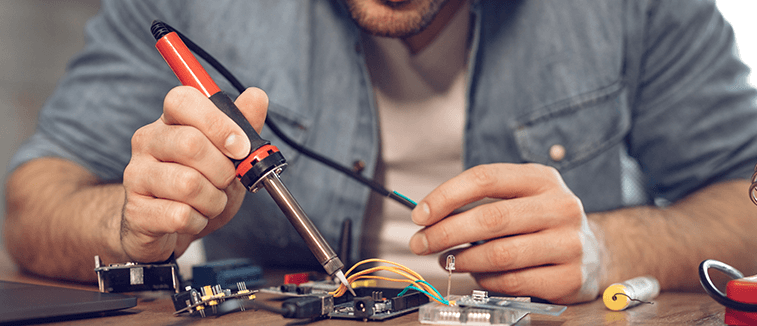Electronics Engineer
On this page
- What's it like to be an Electronics Engineer?
- How to become an Electronics Engineer
- Latest Electronics Engineer jobs
- Top skills and experience for Electronics Engineers
What's it like to be an Electronics Engineer?
Electronics Engineers design, develop, and test electronic devices, components, and systems. They may develop common items for daily use such as mobile phones and televisions, or systems used in aviation and maritime industries. Electronics Engineers may be part of any stage of a project. They could draft the initial brief for an idea, be part of the design team, develop the first prototype of a design and test it, and implement the new product.

Tasks and duties
- Testing devices and systems.
- Working with Engineers, professionals, and clients to ensure projects are completed to the needed specifications.
- Ensuring that products and systems are compliant with health and safety standards.
- Improving designs of electronics.
- Reviewing processes and providing suggestions for improvement.
- Writing manuals, specifications, and reports as needed.
- Working with systems to design, develop, or repair electronics.
Electronics Engineers need to work well with teams because of the collaborative requirements of the job. They may work with colleagues in other engineering teams or with product development and operations teams. Electronics Engineers also need strong analytical and problem-solving skills to succeed in this position.
How to become an Electronics Engineer
A career as an Electronics Engineer requires a degree in electronics engineering, electrical and electronic engineering, or a similar course.
- 1.
Complete a Diploma in Electrical and Electronic Engineering. Once completed, you can explore an apprenticeship or an internship for experience.
- 2.
If you would like to move up the career ladder, consider continuing on to university to complete a Degree in Electrical and Electronic Engineering.
- 3.
Once you’ve completed your degree, you have to register with the Board of Engineers Malaysia (BEM) as a graduate engineer so you can apply to jobs that require experience in electronics engineering.
- 4.
Gain some experience, and you can register as a professional Electrical and Electronic Engineer with the BEM. To qualify, you’ll need 3 years of professional development and work experience. You also need to attend the required classes set by the BEM and pass the Professional Assessment Examination (PAE).